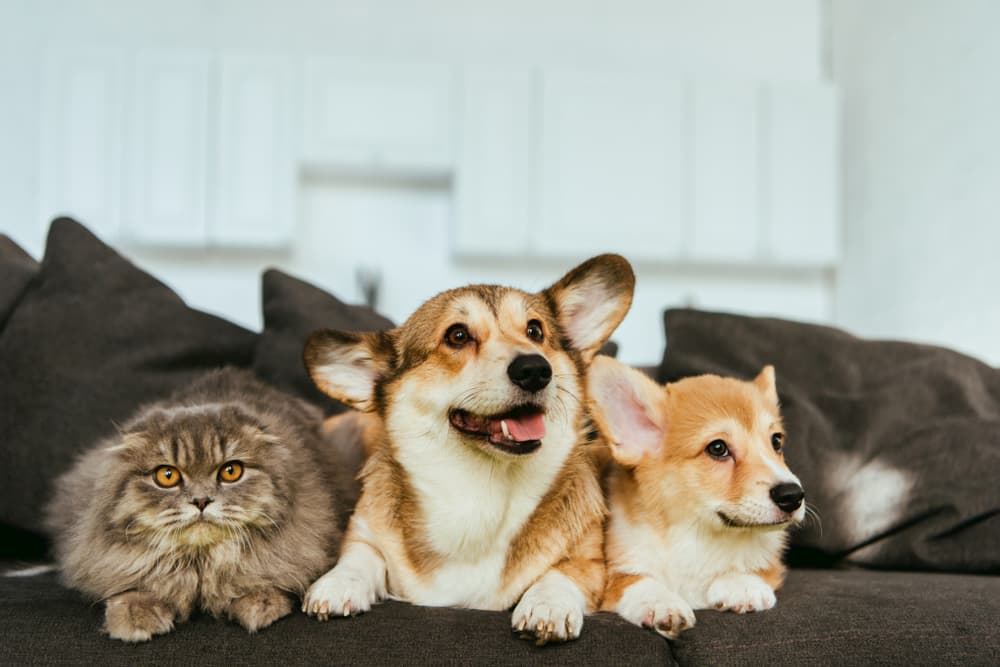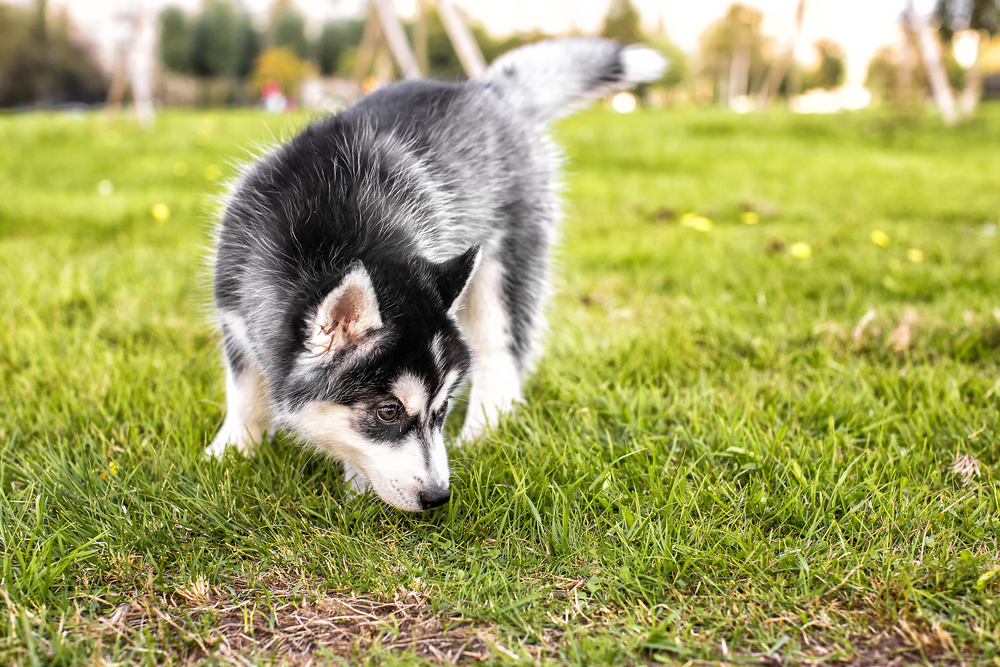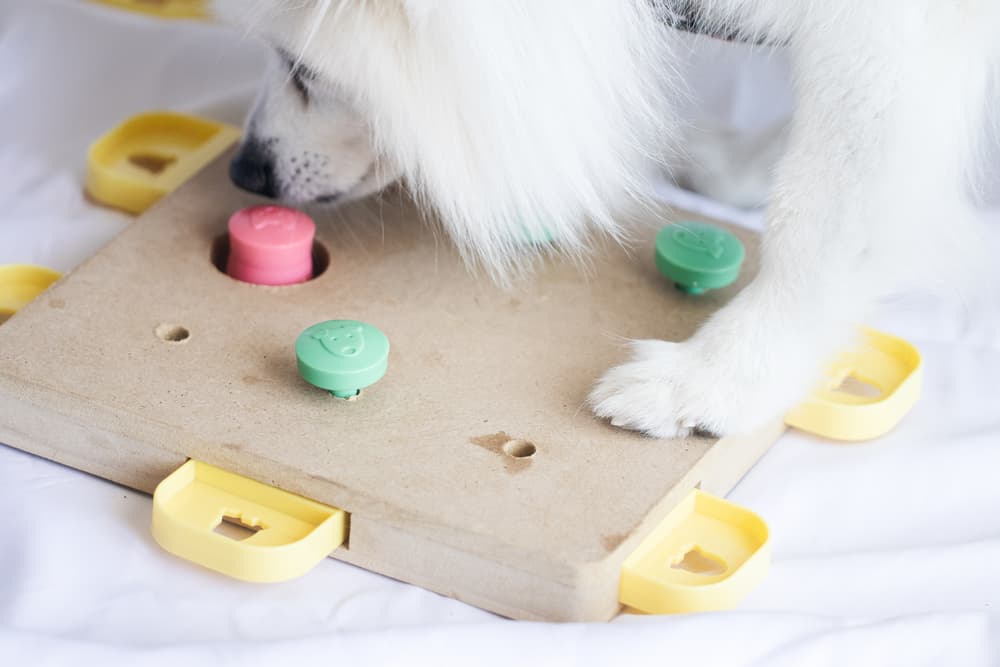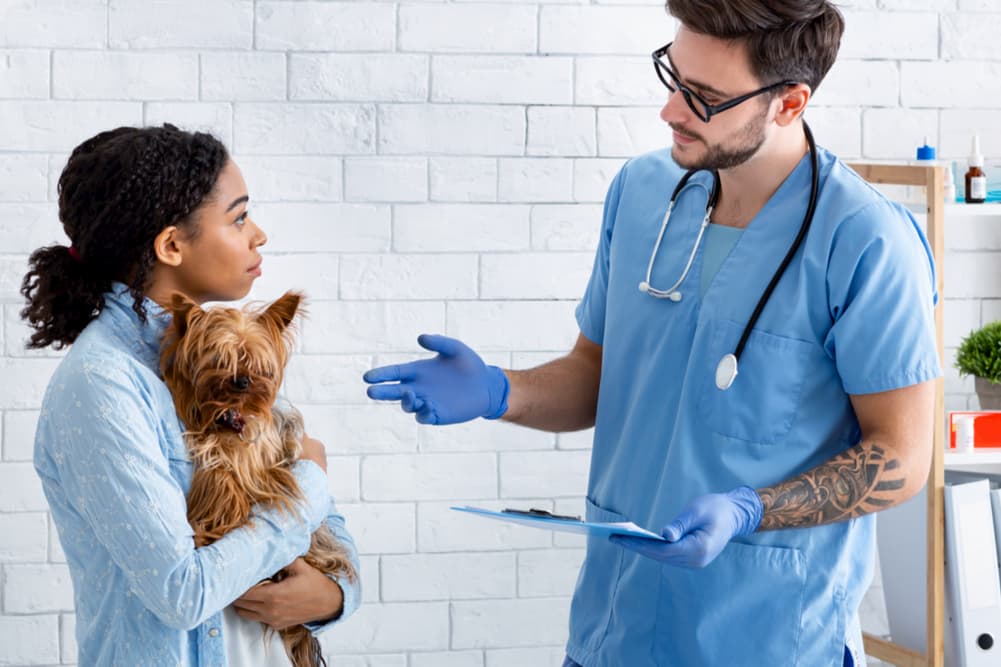Why Do Dogs Eat Poop?

We’ve all seen our dogs do things that we find repulsive. They sniff rotting animal carcasses, lick each other’s butts, and eat their own vomit. But arguably the most disturbing behavior observed in our canine companions is poop eating, also known as coprophagia.
Coprophagia is not unique to dogs and is observed as a natural or even necessary behavior in many animals. Rabbits and rodents, for example, must eat their own poop in order to obtain many essential nutrients [1]. In other young animals, including horses, eating their mother’s poop helps to establish their normal gut microbiome—the good bacteria that lives in the intestines and is essential for health [2].
In this article, we will explore why dogs eat poop, when to be worried about it, and what you can do about this gross behavior.
Why Do Dogs Eat Poop?

More often than not, eating poop is a normal behavior in dogs. After all, poop is stinky and dogs seem to love stinky things.
Eating poop also serves a purpose in some cases. For example, mother dogs need to stimulate newborn puppies to defecate and urinate by licking them and will ingest their poop as a consequence. Mother dogs will also eat their pup’s poop in an effort to keep their dens or living areas clean. Most puppies will also go through a phase of eating poop.
Sometimes, coprophagia can be a sign of disease in dogs. Dogs with diseases that prevent their bodies from digesting and absorbing nutrients will sometimes eat their own poop. This is likely the body’s attempt to get more nutrients.

One such disease is called exocrine pancreatic insufficiency (EPI), which occurs most commonly in German Shepherds. In this disease the pancreas does not produce the enzymes that the body needs to properly digest foods. Common symptoms include large, voluminous soft stools, excessive hunger, and weight loss.
Another more commonly occurring digestive disease that may cause coprophagia is inflammatory bowel disease (IBD). In IBD the intestines are abnormally inflamed and this leads to decreased absorption of nutrients from the diet. Symptoms of IBD are similar to those of EPI. Certain bacterial and parasitic infections can also lead to dogs eating poop.

Dogs with diseases or those receiving medications that cause excessive hunger may also be caught munching on poo. Cushing’s disease, a disease in which the body produces too much cortisol (stress hormone) will commonly make dogs very hungry. Similarly, dogs on steroid medications, such as prednisone, may also eat poop due to increased hunger. Phenobarbital, a common seizure medication, will often increase appetite as well. Diabetes can also make dogs hungry enough to eat poop.
Dogs that eat poop may also have a disorder called pica. Dogs with pica eat non-food items like dirt, sticks, rocks, and sometimes poop. Pica has a variety of causes including psychological and medical issues. Anemia will commonly cause pica so it is important for dogs with pica to undergo blood tests. Pica and coprophagia can also be due to psychological disorders such as obsessive compulsive disorder and separation anxiety.
In other cases, a lack of environmental stimulation can be to blame. Some dogs will eat poop because they are bored. If dogs do not get enough physical and mental exercise, they may develop inappropriate behaviors, such as ingesting their own feces. This can be easily addressed by providing them with more interaction, toys, and exercise.
Similarly, some dogs will eat feces because they can. Feces left in their yard may be the most interesting thing they get to smell all day, so they consume it.
Why Do Dogs Eat Cat Poop?

Some dogs are notorious for raiding the cat litter box and, much to our disgust, feasting on cat poop. For poop-eating pups, it seems that cat poop is extra delicious.
Cats are obligate carnivores whereas dogs are omnivores. For this reason, cat food typically contains more meat and protein than dog food. This is likely why cat food is pretty tasty to most dogs and their poop may have similar tastes.
Cat poop is also readily accessible inside the house so it may be easier to get to than dog poop outside.
Why Do Puppies Eat Poop?

Puppies explore their new and exciting worlds with their mouths. When puppies eat poop it is likely just a part of this normal exploratory behavior. It has also been hypothesized that puppies may eat their own and other animals’ poop in order to establish healthy gut microbiomes [3].
How to Stop Your Dog From Eating Poop

It is important to train your dog not to eat poop as soon as the behavior first starts because the longer that a behavior occurs the more it is reinforced and the harder it will be to extinguish. Follow these steps to help stop your dog from eating poop.
Remove Access
The first step is to remove your dog’s access to poop as much as possible. As soon as your dog poops make sure to pick it up. If you are crate-training your dog, make sure the crate is only large enough for your dog to stand up and turn around. If the crate is too large, he may poop in it and eat the evidence.
If you have a cat at home, consider placing litter boxes on a countertop that your cat can reach but your dog can’t, or use a baby gate to prevent your dog access to the litter box.
Redirect Attention

Next, as soon as you notice that your dog is sniffing or showing interest in poop, redirect his attention to a toy or treat and reward your dog as soon as he leaves the poop alone. You can also work on training your dog to perform a command such as leave it, look or sit every time he goes for poop. Make sure to immediately reward your dog with a very tasty treat as soon as he performs the command.
Don’t Punish Your Dog
It is important never to scold your dog or chase him when he is eating poop. This will likely just make him scarf down the poop more quickly. It may also lead to fear and anxiety, or may inadvertently reward the behavior. He may associate eating poop with a fun game of chase!
Check Your Dog’s Diet and Activity Level

If your dog is eating poop, make sure that he is eating a food that is nutritionally complete and balanced as malnutrition may be a factor. It is also important to make sure that your dog receives plenty of daily exercise and mental stimulation with toys. Dogs that are bored or unstimulated are more likely to be coprophagic.
Try Supplements or Powders
There are certain chews, treats, powders, and supplements that you can give dogs that are designed to improve digestive health or are supposed to make their poop taste bad. These will only work if all the pets in the household are given these products until the dog stops eating poop consistently. However, these products won’t work for all dogs.
Talk to Your Veterinarian

If eating poop has become an ongoing issue for your dog, especially if he has any other abnormal symptoms or behaviors, it is very important to have him evaluated by your veterinarian.
Your veterinarian will rule out medical causes of coprophagia by performing a physical exam, fecal tests and blood tests.
If medical issues have been excluded, you have tried training techniques, and you still cannot stop your dog from eating poop, your veterinarian may refer you to a veterinary behaviorist to help treat a suspected behavioral disorder.









